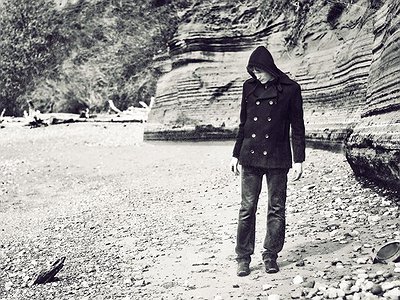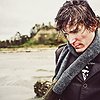When did you start writing/producing music - and what or who were your early passions and influences?
I've been playing music for almost all of my life, ever since my grandfather gave me a little toy piano for my 4th birthday. That said, I've only been releasing music for the past half decade, starting with my debut album Daydreaming in 2007. I was drawn into music heavily when I was a teenager. I was a pretty awkward kid, the kind of loner, skinny, fragile, and bullied boy. From an early time, music became my way of coping with the fact that I didn't seem to belong anywhere. To this day, I still feel like this sometimes.
Early influences included My Bloody Valentine, Harold Budd, Robin Guthrie, King Tubby, Augustus Pablo, The Cure, Joy Division and countless others. I was also influenced by literature and filmmakers, people like Albert Camus, Horacio Quiroga, Werner Herzog, Jan Svankmajer, Antoine de Saint-Exupéry, and others.
What do you personally consider to be the incisive moments in your artistic work and/or career?
I think releasing my first album on Miasmah really opened a lot of doors for me. At the time, it was a fairly low point in my artistic pursuits and that release gave me a lot of motivation to continue and not quit. Aside from that, being able to play and meet some of my favourite musicians while getting paid to do what I do, it's really remarkable and amazing and I'm forever grateful for the opportunity.
What are currently your main compositional- and production-challenges?
Number one is finding time to create content. It's become harder and harder these days with all the travelling and also all the projects I'm currently involved in at this moment. For example, I've been writing an album for Touch for a while now and it seems like I'm nowhere close to finishing it. It would be nice to take a month off and go to a remote area, not have any email, internet and not have any distractions and just create, as purely and simply as possible.
What do you usually start with when working on a new piece?
That's a hard question to answer, as it could be just about anything: a field recording, a sound, a melody in any instrument, a thought, an idea, a feeling. There are so many different things that inspire, it's hard to narrow it down to the “one” thing I always do. My process is constantly evolving, and I rarely repeat myself when it comes to compositional approach. I do not have a “formula” for it. Maybe if I did, I could create content much faster!
How strictly do you separate improvising and composing?
I think the majority of my compositions are based on improvisations. Once I've improvised and recorded something, I'll find a good segment and then compose around it, although this is not always the case.
How do you see the relationship between sound, space and composition?
They are all intertwined. I'm most interested with the spaces between sounds and the power of silence within a composition. What is not said is perhaps as important or more important as what is said.
Do you feel it important that an audience is able to deduct the processes and ideas behind a work purely on the basis of the music? If so, how do you make them transparent?
Not necessarily – sometimes truly magical things happen when you do not know and cannot pinpoint something specific. Sometimes the most incredible things are rather simple when deconstructed and analysed. For me the process is ingrained into the compositions. Many years ago, I would have a particular sound in my head, and I would try to recreate it, basing an entire composition from that idea.
As I've developed further, I've become more and more obsessed with building my own tools to create a new, unique vocabulary. This of course is entirely personal and related to my own limitations as a musician – I'm not a proficient player in any instruments. I just play many instruments based on ideas and feelings I have at the time, so it's not like I can sit down with sheet music and play Bach on the piano.
I took a more “punk “approach/direction, and decided that if I could take an instrument and express an emotion with it, it didn't matter what my technical limitations were. This is of course, part of my process too: I use my limitations as part of my creative process. Rather than seeing something as a handicap, I observe it as opportunity to express myself in a unique way.
At the same time, I do a lot of improvisation in the studio and record everything. Lots and lots of happy accidents tend to happen this way, so then my job as a composer becomes “managing” these accidents while shaping them into compositions, almost as a sculpture artist, as cliché as that comparison may sound.
In how much, do you feel, are creative decisions shaped by cultural differences – and in how much, vice versa, is the perception of sound influenced by cultural differences?
That's an interesting question, as you may know, much of my music is rooted in Northern European musical traditions. There's much to be said about socio-economic and cultural factors determining aesthetics and how people internalise the work. For example, while my music seems to have a good following in Europe, it is increasingly hard to find a decent audience for it in America.
Don't get me wrong, I sell lots of records in America and I find myself one of the fortunate few that can make a living from it. I do feel, however, that it is in Europe where I can thrive the most. This year alone I've done three concerts in North America thus far vs 20 plus in Europe. Perhaps Europeans can relate more to my sensibility, as opposed to people in America.



